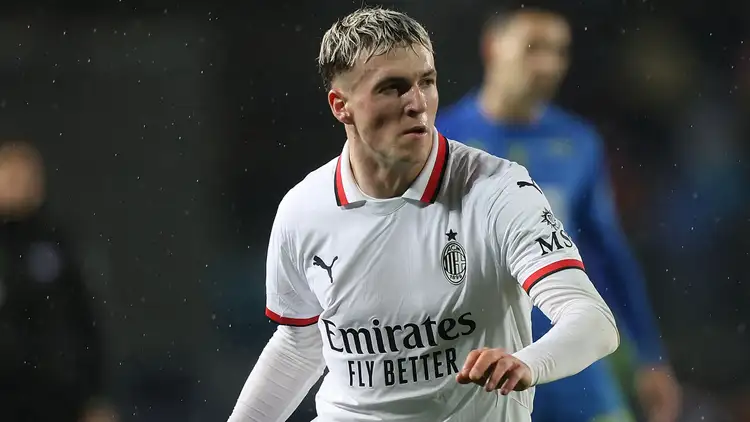The Premier League transfer market is heating up, and once again AFC Bournemouth find themselves at the heart of a potential high-profile move. Reports emerging from Italy and Spain this week suggest that Bournemouth are preparing an improved offer for a promising AC Milan full-back. Yet, the deal is anything but straightforward. Real Madrid, the player’s former club, continue to hold a buy-back option — a clause that could drastically affect the negotiations and, potentially, derail Bournemouth’s ambitious pursuit.
This long-running transfer saga encapsulates the tangled web of modern football transactions, where buy-back clauses, loan deals, resale percentages, and player development pathways often prove just as decisive as the simple willingness of two clubs to agree on a fee. To understand the full context of Bournemouth’s pursuit, one must examine the player’s career trajectory, Milan’s current situation, Bournemouth’s motivations, and, perhaps most crucially, the looming influence of Real Madrid.
The Player in Question: AC Milan’s Emerging Full-Back
The full-back that Bournemouth are targeting is Alex Jiménez, a player whose career trajectory offers a fascinating example of modern talent development in Europe. Born in 2005, Jiménez grew up in Real Madrid’s famed academy system, La Fábrica, which has produced world-class talents like Dani Carvajal, Nacho Fernández, and Achraf Hakimi.
Although Jiménez was never quite as hyped as some of his contemporaries, Madrid’s coaching staff valued his technical intelligence, attacking instincts from the right flank, and ability to play as both a full-back and a wing-back. His rapid development caught the eye of clubs abroad, and in the summer of 2023, AC Milan swooped in to secure his services.
The deal that brought Jiménez to Milan was, however, carefully structured by Real Madrid. Not wanting to lose control of a potentially valuable asset, Madrid inserted a buy-back clause into the contract. This allows Los Blancos to re-sign the player at a pre-determined fee if they deem his progress in Italy worth reclaiming. Such clauses have become increasingly common for Madrid in recent years, especially given the success they found with players like Carvajal, who was bought back from Bayer Leverkusen after proving his worth.
Jiménez’s time at Milan has been one of steady adaptation rather than immediate stardom. Playing primarily with Milan’s Primavera (youth) side and occasionally training with the senior squad, he has showcased flashes of promise but is yet to establish himself as a first-team regular. For Milan, Jiménez remains a project for the future — talented enough to keep, but also not indispensable in the short term.
This is precisely where Bournemouth enter the picture.
Bournemouth’s Interest: Building a Squad for the Future
Bournemouth, under the ownership of Bill Foley’s Black Knight Football Club group, have been attempting to carve out a sustainable strategy in the Premier League. No longer content to simply scrape by and avoid relegation, the Cherries have invested in promising young players who can be developed, resold at profit, or integrated into a squad with long-term stability.
The south-coast side’s recruitment policy has shifted to a more European model. Instead of spending heavily on mid-table veterans, Bournemouth have targeted emerging talents across Europe — names that might not always dominate headlines but who fit into their progressive footballing style under manager Andoni Iraola. Iraola, who arrived from Rayo Vallecano, places immense value on energetic, versatile full-backs who can contribute to both phases of play.
In Jiménez, Bournemouth see a player who could potentially fit this mold perfectly. His athleticism, stamina, and willingness to overlap make him an ideal candidate for Iraola’s system, which demands intensity on the wings and constant defensive transitions. Importantly, Jiménez would not only fill a role in the squad but also represent an investment in future resale value — a hallmark of Bournemouth’s evolving recruitment strategy.
However, the challenge lies in convincing AC Milan to part ways with him permanently, and in navigating Real Madrid’s ever-present buy-back clause.
The First Offer: Bournemouth’s Initial Approach
Reports suggest that Bournemouth had already tabled an initial offer to AC Milan earlier this summer. While the exact figures have not been officially confirmed, insiders hint that the offer was in the region of €5-7 million. Milan, however, were unimpressed.
From the Italian club’s perspective, Jiménez is a player with more long-term potential than immediate value. Selling him outright for a modest fee could prove shortsighted, especially considering Madrid’s buy-back clause. If Madrid were to activate their option in the future, Milan would risk losing the player at a pre-agreed rate, potentially for less than market value. For this reason, Milan were not prepared to accept Bournemouth’s opening bid.
Instead, Milan indicated that any serious offer would need to reflect Jiménez’s projected trajectory. While the Rossoneri were not entirely opposed to selling, they wanted assurances in the form of add-ons, resale percentages, and performance bonuses.
Bournemouth’s Improved Offer: A Renewed Attempt
Now, as the summer window progresses, Bournemouth are preparing to return with an improved offer. This second proposal, according to sources close to the deal, could rise closer to €10 million with add-ons included.
The structure of the deal is crucial here. Bournemouth are believed to be willing to include a percentage of any future resale fee back to AC Milan, a common practice when bigger clubs part ways with younger players. Such clauses protect Milan’s long-term financial interest in Jiménez while allowing Bournemouth to secure his immediate services.
In addition, Bournemouth may propose performance-based incentives tied to appearances in the Premier League, international call-ups, or milestones achieved over the next few seasons. These sweeteners could help bridge the gap between Milan’s valuation and Bournemouth’s willingness to spend.
The Real Madrid Complication: Buy-Back Clause
All of these negotiations, however, are overshadowed by the buy-back clause held by Real Madrid.
For Madrid, such clauses are not symbolic. The club has a proven history of using them strategically. Dani Carvajal’s successful stint at Bayer Leverkusen in 2012–2013 is the most famous example; Madrid exercised their option to bring him back after just one season, and Carvajal went on to become a stalwart at right-back for both Madrid and Spain. Similarly, players like Álvaro Morata and Mariano Díaz have also returned to Madrid after successful spells elsewhere.
The clause in Jiménez’s contract reportedly allows Madrid to repurchase him for a fee of around €8-10 million within a certain timeframe. If Bournemouth were to buy him from Milan, Madrid would retain the option to nullify that move by activating their buy-back clause — effectively snatching him away just as Bournemouth bring him into their fold.
This is where the complications arise. For Bournemouth, committing significant funds to a player whose rights could be reclaimed by Madrid in the near future represents a risky gamble. If Madrid decide to re-sign Jiménez after Bournemouth have invested in his development, the Cherries could end up losing out on both the player and the potential resale value.
To mitigate this risk, Bournemouth may seek assurances from Milan regarding the specifics of Madrid’s buy-back clause — whether it expires after a certain period, whether it can be renegotiated, or whether it could be bypassed entirely if Madrid decline to act during the current window.
Milan’s Stance: Reluctance Meets Financial Pragmatism
For AC Milan, Jiménez is a player of promise, but he is not yet central to their long-term plans. The club’s current full-back options include the likes of Davide Calabria, Theo Hernández, and Alessandro Florenzi, all of whom are ahead in the pecking order. In that sense, Milan could afford to let Jiménez leave without significantly weakening their squad.
Yet, Milan are equally aware of the potential risk of undervaluing him. The Rossoneri’s management have grown increasingly cautious after seeing young talents depart for modest sums only to flourish elsewhere. The modern game has shown countless examples: Achraf Hakimi, Jadon Sancho, and even Milan’s own former youth players who blossomed after leaving the San Siro.
As such, Milan’s stance is one of cautious pragmatism. They are open to a sale if Bournemouth’s improved offer reflects not just Jiménez’s current ability but also his projected market value. That means higher base fees, resale clauses, and potentially even a buy-back option for Milan themselves — a safeguard that would allow them to re-sign Jiménez in the future should his development in England prove exceptional.
The Player’s Perspective: Jiménez’s Next Step
While much of the focus has been on the clubs, it is worth considering the player’s perspective. For Jiménez, the prospect of joining Bournemouth represents both opportunity and risk.
On one hand, the Premier League offers unparalleled visibility and a chance to test himself against some of the world’s best attackers. Bournemouth’s style under Iraola could suit his game, and the Cherries have shown faith in young talents before. At Milan, his pathway to first-team football is blocked by more established players, whereas Bournemouth might provide a clearer route to regular minutes.
On the other hand, leaving Milan so soon could be perceived as premature. At just 19 years old, Jiménez is still developing physically and tactically. Serie A has long been considered an excellent environment for young defenders to hone their craft, and moving too quickly might hinder his growth. Moreover, the uncertainty surrounding Real Madrid’s buy-back clause adds another layer of instability.
If Madrid remain genuinely interested in monitoring his progress, Jiménez might find himself caught between three clubs — Milan, Bournemouth, and Madrid — each with its own priorities.
The Wider Context: Modern Football’s Complex Transfer Web
This saga illustrates the increasingly complex landscape of football transfers. Gone are the days when deals were straightforward transactions of cash for player. Today, modern transfers are multi-layered agreements involving:
- Buy-back clauses (protecting selling clubs’ long-term interests).
- Resale percentages (ensuring future financial returns).
- Performance-based add-ons (mitigating risk for buying clubs).
- Loan-to-buy options (allowing flexibility for both parties).
Each of these elements reflects the evolving dynamics of the football economy, where clubs must balance sporting ambition with financial sustainability. For Bournemouth, Jiménez represents both an immediate tactical asset and a long-term financial investment. For Milan, he is both expendable and potentially valuable in the future. For Madrid, he is a talent to be monitored and perhaps reclaimed if his growth justifies it.
Fan Reactions: Cautious Optimism and Debate
Unsurprisingly, fans across all three clubs have voiced strong opinions on the matter.
- Bournemouth fans: Many are excited by the prospect of securing a highly rated young talent from a club like Milan. The Cherries’ supporters see this as evidence of the club’s ambition to establish itself in the Premier League beyond mere survival. At the same time, some worry about the Madrid buy-back clause and whether Bournemouth could be used as a stepping stone.
- Milan fans: The Rossoneri faithful are divided. Some argue that selling Jiménez now, when he has yet to prove himself, makes financial sense. Others fear that Milan could repeat past mistakes of losing promising youngsters only to regret it later. The inclusion of resale clauses or a buy-back could ease these concerns.
- Madrid fans: For Real Madrid supporters, Jiménez is not yet a household name, but many trust the club’s scouting system. The buy-back clause reassures them that if he truly flourishes abroad, Madrid can bring him back. In many ways, Madrid are in the most comfortable position — they lose little by letting him develop elsewhere while retaining control over his future.
What Happens Next? The Possible Scenarios
Several outcomes remain possible as negotiations unfold:
- Bournemouth Sign Jiménez Permanently: If their improved offer satisfies Milan and Madrid do not intervene immediately, Bournemouth could secure the player on a long-term deal. This would represent a major coup for the Cherries and a show of faith in their transfer strategy.
- Madrid Activate Buy-Back Immediately: Unlikely but not impossible, Madrid could choose to re-sign Jiménez now, especially if they view him as valuable depth for their squad. This would end Bournemouth’s pursuit before it begins.
- Milan Loan Jiménez Instead: A compromise scenario could see Milan send Jiménez to Bournemouth on loan, perhaps with an option to buy. This would allow Bournemouth to test the waters while giving Milan (and Madrid) more time to evaluate his progress.
- Negotiations Collapse: If neither side is willing to compromise on valuation or contractual structure, the deal could fall through altogether, leaving Jiménez at Milan for another season.
Conclusion: A Saga That Defines Modern Transfers
The story of Bournemouth’s pursuit of AC Milan’s Alex Jiménez is more than just another transfer rumor. It encapsulates the intricacies of modern football’s market, where three clubs with different agendas intersect around the career of a single player.
For Bournemouth, this is a bold step in their journey toward establishing themselves as more than just survivors in the Premier League. For Milan, it is a test of their ability to balance short-term pragmatism with long-term vision. For Madrid, it is another example of their calculated use of buy-back clauses to retain influence over their academy products.
Whatever the outcome, one thing is clear: Jiménez’s future will be shaped not only by his talent on the pitch but also by the financial and strategic maneuverings of some of Europe’s most ambitious clubs.




